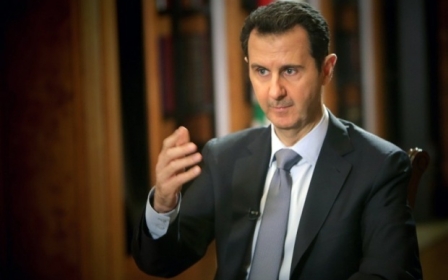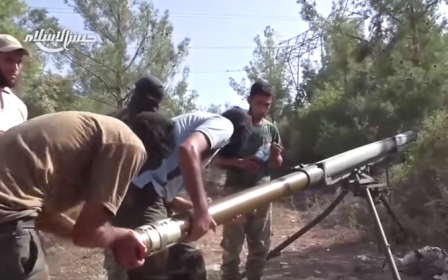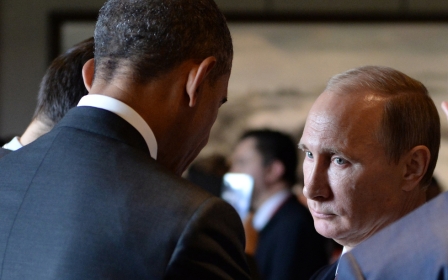Barbs traded at the UN over Syria

Hours before their high-stakes meeting on the UN sidelines, the US and Russian presidents traded criticism on Monday over their diverging plans to solve the four-year-old civil war in Syria.
While Barack Obama denounced those who support Syrian President Bashar al-Assad, Vladimir Putin said the West's refusal to cooperate with Assad to fight the Islamic State group (IS) was an "enormous mistake".
In what appeared to be a thinly veiled poke at Russia, Obama told the annual General Assembly of world leaders that some states prefer stability over the international order mandated by the UN charter, and try to impose it by force.
"We're told that such retrenchment is required to beat back disorder, that it's the only way to stamp out terrorism or prevent foreign meddling," he said. "In accordance with this logic, we should support tyrants like Bashar al-Assad who drop barrel bombs to massacre innocent children because the alternative is surely worse."
About an hour after Obama spoke, Putin - who reportedly said last week that he would start unilateral airstrikes on IS in Syria if Obama rejected his offer for the two countries to join forces - said it was time for the West to be clear about who is really fighting IS.
“We should finally acknowledge that no one but President Assad’s armed forces and [Kurdish] militia are truly fighting the Islamic State and other terrorist organisations in Syria," he said.
Putin also suggested that the so-called moderate Syrian rebels that the US has armed and trained later join IS.
Standing tensions between the US and Russia over Syria have heated up in recent weeks, as Russia has escalated its military support of Assad's beleaguered government, including deploying at least 28 jets as well as soldiers on the ground.
Some rebel groups have reported that they have encountered stronger resistance from pro-government forces since the Russians increased their support.
On Sunday, Iraq, Russia, Iran and Syria announced that they had agreed to set up an intelligence committee in Baghdad to bring together efforts to fight IS, a move over which US Secretary of State John Kerry expressed displeasure after the announcement.
“I think the critical thing is that all of the efforts need to be coordinated,” Kerry said before meeting Russia’s foreign minister, Sergey Lavrov, in New York. “This is not yet coordinated. I think we have concerns about how we’re going to go forward, but that’s precisely what we’re meeting on to talk about now.”
Earlier on Monday, Russia's deputy foreign minister told Russia's RIA Novosti news agency that the a contract group including the US, Russia, Iran, Saudi Arabia, Turkey and Egypt, would participate in talks in October.
The contact group, said Mikhail Bogdanov, will work in conjunction with UN envoy to Syria Staffan de Mistura's plan that involves the formation of four working groups. De Mistura has said he hopes that the working gorups will lay the ground for a political soluation to the conflict.
A Syria contact group has reportedly been discussed in recent weeks by the UN and in diplomatic circles, but Bogdanov's public discussion of it was thought to be the first time was mentioned publicly, the Guardian reported.
Meanwhile, Iranian President Hassan Rouhani called for a united front to fight groups like IS and said Tehran was ready to help "bring about democracy" in Syria and Yemen.
Making his first address to the UN General Assembly since the historic nuclear deal was reached, Rouhani waded into the intense diplomatic debate over fighting rebel groups and pushing a change in government in Syria.
Rouhani extended an invitation "to the whole world and especially the countries in my region to form a joint comprehensive plan of action to create a united front against extremism and violence."
Rouhani accuses Riyadh over Hajj deaths
The Iranian leader also accused Saudi Arabia of incompetence over the deadly Hajj stampede and demanded an investigation of the disaster.
A total of 769 pilgrims including 226 Iranians were killed in the worst tragedy to hit the Hajj in a quarter-century.
The pilgrims were taking part in a "grand and global spiritual gathering of the Hajj" but "fell victim to the incompetence and mismanagement of those in charge," said Rouhani.
Iran has been deeply critical of Saudi Arabia over the tragedy, accusing its regional rival of serious safety lapses.
The Iranian president was to cut short his visit to New York and return to Tehran after his address to attend a repatriation ceremony for the bodies of the victims.
Stay informed with MEE's newsletters
Sign up to get the latest alerts, insights and analysis, starting with Turkey Unpacked
Middle East Eye delivers independent and unrivalled coverage and analysis of the Middle East, North Africa and beyond. To learn more about republishing this content and the associated fees, please fill out this form. More about MEE can be found here.




